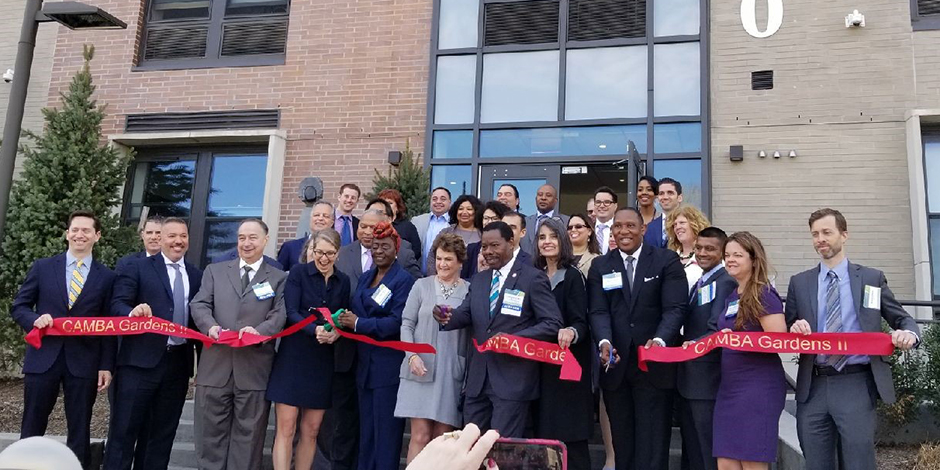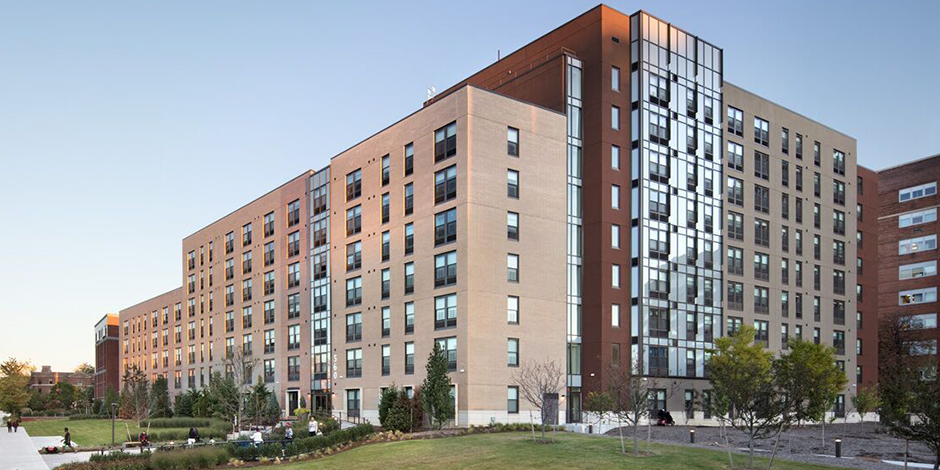NYC Health + Hospitals Joins with CAMBA Housing Ventures and CAMBA in Celebrating the Opening of Supportive Housing on the NYC Health + Hospitals/Kings County Campus
293 new units of affordable and supportive housing in Central Brooklyn
Apr 24, 2018

NYC Health + Hospitals joined with CAMBA Housing Ventures and its partners today to mark the official opening of CAMBA Gardens Phase II, a $100 million housing development providing 293 units of affordable and supportive housing on the campus of NYC Health + Hospitals/Kings County.
Along with CAMBA Gardens Phase I, which opened in October 2013, the two developments provide a combined 502 affordable and supportive rental housing units for low-income residents, many of whom have been or will be connected to needed social services and health services.
Developed by CAMBA Housing Ventures, the 293 apartments include a mix of studios, one-bedrooms, two-bedrooms, and three-bedrooms, with 110 designated for families and individuals in the community making no more than 60% of the area median income and 182 for formerly homeless families and individuals. Designed and built to achieve recognized green standards (e.g., New York State Research and Development Authority, Enterprise Green Communities, and Leadership in Energy & Environmental Design – Gold rating), the housing development features Energy Star appliances and lighting, as well as high-efficiency building systems. The new building brings in 38 permanent new jobs, including for maintenance, front desk security, and on-site social service staff.
“A part of our public health system’s plan is to pursue a more assertive approach around the social determinants of health, especially housing,” said Mitchell Katz, MD, president and chief executive officer at NYC Health + Hospitals. “It’s impossible for people who are homeless or even living in a shelter to maintain an optimum state of health if they have a serious chronic disease. For many, long-term housing can be the best medicine.”
CAMBA provides a number of on-site services, including helping residents to develop service plans based on their needs and providing independent living skills training, financial literacy, a job readiness program, substance abuse programming, and group social events such as movie nights, arts and crafts, and organized cultural and sporting events.
“With the completion of CAMBA Gardens Phase II, we celebrate the realization of our dream to provide affordable housing, access to supportive services, and quality health care in one place for 293 households,” said Joanne M. Oplustil, president and CEO, CAMBA/CAMBA Housing Ventures, Inc. “A true public-private partnership, CAMBA Gardens would not be possible without the support of our invaluable partners, including New York State, New York City, HCR, HPD, NYC Health + Hospitals/Kings County, elected officials and countless others, and we and the residents of CAMBA Gardens thank you.”
“This beautiful new building is just another symbol of our hospital’s commitment to the community,” said Sheldon McLeod, chief executive officer of NYC Health + Hospitals/Kings County. “The space used to be occupied by a hospital building that fell into disuse, and we’ve helped turn it into a home for many, a vehicle for supportive care for some, and a financial engine that will benefit many others in the neighborhood. And keeping people well in their new homes, rather than treating them in the emergency room, will help reduce avoidable hospitalizations—something we all want. It’s what’s best for the neighboring community and all of Central Brooklyn.”
“CAMBA Gardens Phase II demonstrates what can be accomplished through true government and community partnerships,” said Deputy Mayor for Health and Human Services Dr. Herminia Palacio. “Health does not happen within the four walls of a doctor’s office, it happens foremost at home. These 293 supportive housing units will go a long way in helping residents be their healthiest selves. This is another step forward in accomplishing this administration’s vision towards a better and fairer New York City.”
“Expanding affordable housing across Brooklyn is of the utmost importance, particularly as residents face cost of living increases and rising rents,” said Brooklyn Borough President Eric L. Adams. “I’m proud to have supported CAMBA on this exciting project with $1 million in FY14 capital investment, which will help deliver much-needed, energy-efficient housing to East Flatbush, an area of the borough that has experienced decades of economic disadvantage. We must continue to increase the amount of affordable housing being developed in every corner of the borough, so that everyone can find a healthy and stable place to call home regardless of their socioeconomic status.”
“The grand opening of CAMBA Gardens Phase II is an important step in our city’s commitment to providing housing and social services for members of our underserved community,” said Councilmember Dr. Mathieu Eugene. “I believe that all New Yorkers have the right to a stable living environment, and this facility will serve as a tremendous benefit to those who have struggled to secure long term housing. I want to express my gratitude to the many partners who have worked together to make this project a reality, and it is my hope that it will serve as a model for other housing initiatives across the city.”
Other affordable and/or supportive housing under construction on or near NYC Health + Hospitals campuses includes Draper Hall I and II (354 units combined, adjacent to NYC Health + Hospitals/Metropolitan), the T Building (206 units on the campus of NYC Health + Hospitals/Queens), and ComuniLife (89 units on the campus of NYC Health + Hospitals/Woodhull). Housing constructed earlier includes CAMBA Gardens Phase 1 (207 units on the campus of NYC Health + Hospitals/Kings County) and Metro East (176 units adjacent to NYC Health + Hospitals/Metropolitan).
In addition to CAMBA Housing Ventures/CAMBA, and NYC Health + Hospitals, the partners on the project included New York State, New York City, Homes and Community Renewal, Housing Preservation and Development, elected officials, design and construction companies, and a range of funding partners.
